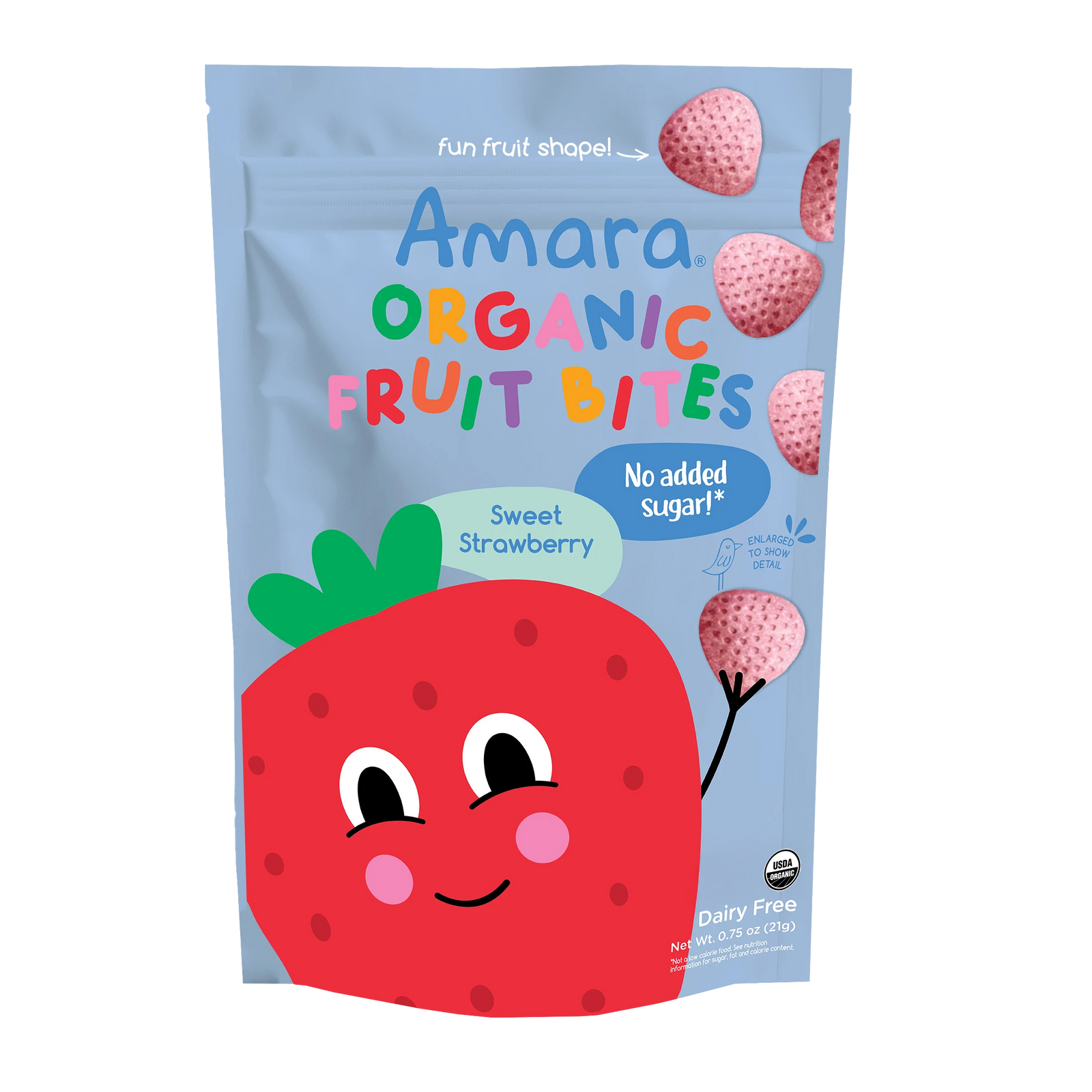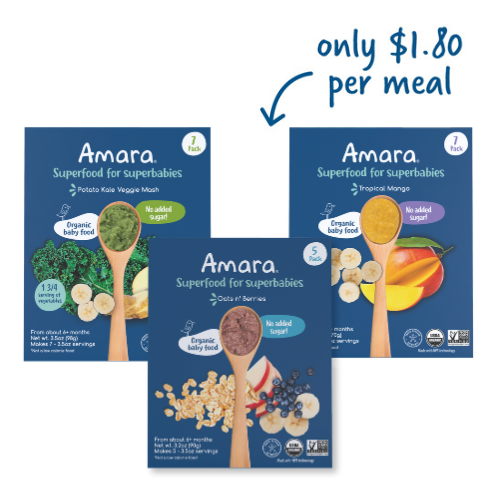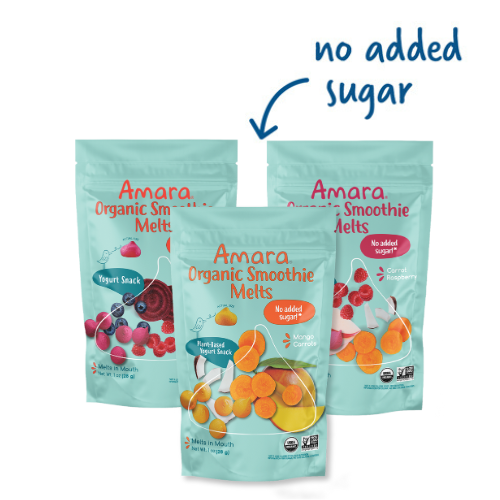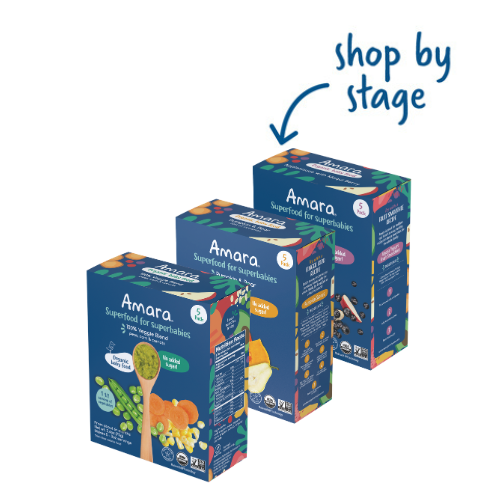
Starting solids is one of those classic milestones that most parents treasure — first bites make for some adorable, lovable, often hilarious, and without doubt,sloppy moments. Hah!
But getting started with solids can also be emotional, and sometimes even stressful. If you’re here, we’re guessing you probably already know and believe that nutrition is incredibly important for moms and babies — and it’s true, it is!
In fact, our children’s first experiences with food — during infancy and the toddler years — are momentous not only for nutritional purposes (healthy physical growth and brain development), but also for the habits and expectations they teach. You see, many of our eating habits and taste preferences are formed in the first few years of life, which is *really cool, but can also be a bit nerve-wracking, especially if it’s your first time on the merry-go-round.
The good news? If you offer your baby a variety of fresh, whole foods with different flavors and textures, there’s virtually no way you can go wrong. Yes: when it comes to feeding babies, there is no established “normal.” Feeding schedules may vary from one family to the next, or even from week-to-week or day-to-day depending on your own calendar. And every baby is different, too. Not to mention, even the same baby might differ (sometimes wildly) from one day to the next in terms of what they eat, how they eat, or how much they eat.
Actually, if there is any normal, it’svariability.
For your part, this means that when you’re starting solids, you need not adhere to any strict timetable, check any boxes, or stress about being “behind” (or ahead, for that matter).
Instead, thefour best things you can do throughout the process are to:
- Find your zen: You want to establish a positive relationship with food and mealtimes, and the best way to start to do just that is to adopt a happy, patient, and low-stress approach toward feeding, however you choose to do it. Your baby will pick up on all that joy. 😊
- Offer a diverse variety of healthy, whole foods:Exposing your baby to as many different tastes and textures as possible will help them develop a palate for diverse, healthy foodsand serve to normalize the simple act of trying new foods.
- Don’t force your baby to eat anything:Always let your baby decide when to stop eating. (I would you refer you back to #1, LOL.)
- Keep family mealtime in mind: The earlier you start enjoying mealtime at the table with your baby, the better, because eating shared meals together at the table as a family comes with a whole host of benefits that will last throughout childhood and even into adulthood.
Okay, so hopefully you’re with us that there are no strict “norms” for feeding babies,BUT —it can still be quite helpful and reassuring to have a general sense of what folks are doing at various ages.
Thus, see below to learn about some of the salient points for feeding babies 4-6 months, 6-8 months, 9-11 months, and 12+ months — and know that the general idea over this broad time frame is to start to gradually shift the ratio between liquids and solids such that you go from exclusive breastmilk/formula when you start out to predominantly solid foods by the first birthday.
4-6 months:
- This stretch is *really just about introducing your baby to food — it takes some time for them to get used to it, really! — and the concept of eating in general. There’s a learning curve…
- Breastmilk and/or formula are still the predominant source of nutrition and sustenance for babies (by A LOT).
- Most babies don’t actually eat very much food at all during this time frame — it’s more like tasting.
- Have fun, and don’t worry too much about anything other than dipping your toe in the water, so to speak!
6-8 months:
- Many babies start taking in ~200 calories per day during these months, plus their breastmilk/formula.
- Most parents feed babies between 1 and 3 meals daily.
- A “meal” can be anything from a bite to several tablespoons (remember, don’t force anything), but often consists of ~2-3 tablespoons of baby food.
- In the easy meal department, some fan favorites include: banana, sweet potatoes, and avocados.
- Focus on beginning to incorporate a greater diversity of flavors and textures during these months — you can also begin to play around with thicker blends and chunkier purees. We especially love Amara’s organic baby foods because their nutrition protection technology locks in real foods’ fresh flavor and textures, and you can even customize the consistency by adding more or less liquids — it’s pretty awesome.
- Know that there WILL come a time when your baby will refuse to eat something, throw food at the wall, or otherwise thwart your plans — remember: stay calm and keep it positive.
9-11 Months
- Many babies 9-11 months take in ~300 calories daily in addition to breastmilk/formula.
- Many families like a 2-4 meal schedule on most days.
- Meals may start to look “bigger,” as in ~ ½ cup food at a sitting (but can be less or more, and that’s OK, too!).
- Keep working on your diversity project — try to introduce your baby to foods with different textures, new foods, different colors, and even finger foods as much as you can. The goal is to make eating a diverse diet and trying new foods bothvery normal behaviors that your baby is comfortable with and accepts as par.
- This is a time when many parents have fun playing around with food pairings and more exotic recipes — have at it!
12+ months
- After they turn one, most babies are eating some 500 calories of solid foods daily.
- Some families choose to wean their babies off breastmilk or formula entirely around the one-year mark, while others choose to continue breastfeeding or offering bottles.
- Babies can follow a relatively “grown-up” eating schedule at this point — most folks like a 3 meals/2 snacks per day rhythm.
- For the most part (save choking hazards, see our extended FAQ below), babies who are at least 1-year-old can eat what your family eats. You may need to continue to prep their plates a bit differently — aka mash/smash/cut/blend as needed — but most babies can consume a relatively “normal” diet at this point (hah).

FAQ:
- When can babies eat puffs?
Most babies can start eating puffs ~7-9 months.
- When can babies eat cheerios?
It’s safe to offer Cheerios whenever they are capable of picking them up and bringing them to their mouth to eat. (For most, this is ~9-12 months of age.)
- Can babies eat hummus?
Yes — hummus is a wonderful baby food!
- Can babies eat bell peppers?
Yes — babies can begin consuming bell peppers whenever they’re ready to start solids, just make sure you prep them accordingly. From ~6-9 months, prep bell peppers for babies by removing the skin and cooking them; from 9-18 months, you can offer small chopped, cooked pieces or very thinly-sliced raw sticks.
- Can babies eat corn?
Whole corn kernels are a choking hazard for babies, but pureed corn is a great option. Corn is a finicky ingredient to puree well/easily, though, so we love Amara’s organic black bean & sweet corn baby food.
- Can babies eat edamame?
Edamame beans are a choking hazard for babies, but they can be pureed and safely offered to babies 6-9 months as food on their own.
- Can babies eat pineapple?
Pineapple can present a choking hazard for babies. Older babies capable of self-feeding may be able to gnaw on slices or sticks, though.
- Can babies eat rice?
Yes and no — babies can safely consume rice/rice products from the time they are ready to start solids, but since rice and rice-based foods contain arsenic, it may be best to limit rice products somewhat. Many babies enjoy rice cereals, but the Centers for Disease Control and prevention classify whole grain rice as a possible choking hazard for babies <12 months.
- Can babies eat dragon fruit?
Yes, as long as it’s prepared appropriately: peel it and puree or offer in cut spears for babies who self-feed.
Want to learn more, check out our other popular posts, "How to Raise a Healthy Eater from the Start," "Dairy and your Baby," and "The Problem with Puffs."








Leave A Comment